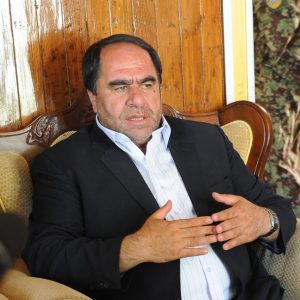On Sunday night, Afghan special forces failed to capture Keramuddin Karim, the former president of the Afghanistan Football Federation who is on the run from sexual abuse charges. The botched raid in Panjshir province was reportedly met with resistance from Karim’s supporters.
Karim is accused of sexually assaulting and harassing several players on the women’s national team. In Noevmber 2018, The Guardian reported that FIFA was investigating allegations of sexual abuse made by female players against men, including Karim, within the Afghanistan Football Federation (AFF). In December 2018, The Guardian published another report, highlighting the alleged depravity of Karim in his treatment of female players:
One said Karim put a gun to her head after he punched her in the face and sexually assaulted her in a hidden bedroom accessed from his office, threatening to shoot her and her family if she spoke to the media.
In March 2019, FIFA suspended Karim while the investigation continued. That June, FIFA found Karim “guilty of having abused his position and sexually abused various female players, in violation of the FIFA Code of Ethics.” The body then banned him for life “from all football-related activities (administrative, sports or any other) at both national and international level” and issued a fine of 1 million Swiss francs ($1.06 million).
Afghan authorities issued an arrest warrant for Karim in June 2019 but to date have been unable to arrest him. This summer the Court of Arbitration for Sport upheld FIFA’s ban on Karim. The panel did not mince words, noting that “unlike bribery and match-fixing which damage the integrity of the sport, the offenses committed by Keramuddin Karim violated basic human rights and damaged the mental and physical dignity and integrity of young female players.”
Karim served as AFF’s president from 2004 to his banning in 2019, with the allegations dating to the five year period starting in 2015. But soccer is not all Karim controlled in Afghanistan. From April 2010 to November 2013, he served as governor of Panjshir — where’s he’s now holed up.
According to RFE/RL, the August 23 attempt to detain him focused on Panjshir’s provincial capital, Bazarak, where a standoff took place between “Interior Ministry forces and around 200 mostly armed residents” and lasted about 2.5 hours. The Associated Press stated that the raid targeted the village of Sangi. Per TOLO News’ report, there was no coordination between national and local forces.
Amin Sediqqi, the deputy governor of Panjshir province, said the arresting forces were met with a “reaction” by armed men. He said provincial authorities were not aware of the operation and are now working through local elders to calm the situation. No one was killed or wounded in the confrontation, he said.
Karim’s continued evasion exposes several uncomfortable truths for the Afghan authorities.
The inability to arrest him reflects the continued power of local warlords and the limits to Kabul’s influence. That Afghanistan’s national-level forces neglected to inform local forces of the raid underscores either incompetence, or, more realistically, an absence of trust. Indeed, last month, Afghan President Ashraf Ghani called on the people of Panjshir to expel Karim so he could face justice — that clearly has not happened.
Afghan Vice President Amrullah Saleh reportedly said that the Ministry of Interior Affairs has been ordered to summon Panjshir officials in the wake of the failed capture attempt. He also, as Khaama Press phrased it, “said that those hands behind sending Special Forces in last night’s operation should be unveiled.” Saleh urged Karim to turn himself in to face justice. Given that Afghan authorities have failed to follow up on charges of sexual abuse levied against other powerful Afghans — like Abdul Rashid Dostum, who was promoted this summer to the highest military rank of marshal — it seems likely that Karim’s day in court will never come.
The course of events also highlights the authorities’ failure to uphold women’s rights, a particularly sensitive topic as the Afghan government nears direct negotiations with the Taliban. While talks have been delayed, there remains concerns that progress for women made after the fall of the draconian Taliban regime will become the price Kabul pays for peace.
With reporting by the Associated Press.
































